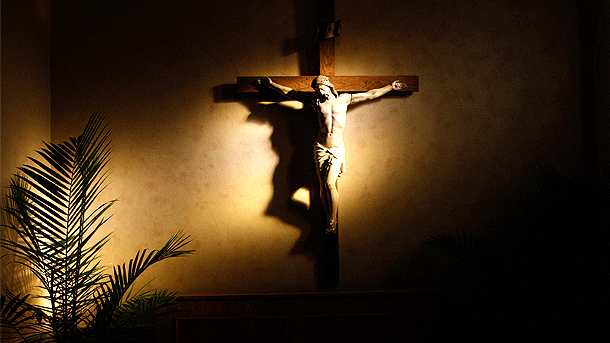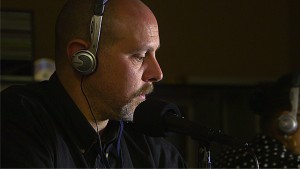

Deacon-structing: The Cross- Part 3
Deacon Pedro
Sunday, September 21, 2014

Last Sunday was the Feast of the Triumph or Exaltation of the Cross. For the last two Sundays on the S+L Blog, we’ve been looking at why we exalt the cross, an instrument of death. We saw that Jesus died to destroy death forever, so we don’t have to be under the power of death anymore. Sin leads to death. But also disobedience. It was Adam and Eve’s disobedience that led to death.
Now listen to something St. Paul says in his letter to the Philippians, which was the second reading last Sunday: “He humbled himself and became obedient to the point of death – even death on a cross.” (Phil 2:8). It was because of Adam’s disobedience that sin entered into the world. St. Paul also says that, in the same way that Adam’s disobedience made us sinners, Jesus’ obedience makes us righteous (Rom 5:19).
So I’m thinking that maybe this whole salvation thing doesn’t have to do so much with suffering as it has to do with obedience. How many times does Jesus talk about doing his Father’s will? “I have come not to do my will,” (Jn 6:38) or “My food is to do the will of the one who sent me,” (Jn 4:34) and “I do as the Father has commanded me.” (Jn 14:31) And in the Garden of Gethsemane, he struggles with God’s will (Mt 26:39-42; Mk 14:36; Lk 22:42; Jn 18:11), but he was obedient (Heb 5:8-9). And because of his obedience God highly exalted him (Phil 2:9).
And we, too, exalt him.
I wonder if that, in a way, is what last Sunday's first reading — the story about Moses and the bronze serpent — was about (Num 21:4-9). If you think about it, God could have healed all those people with anything. Why ask Moses to make a serpent and lift it up on a pole and then ask all the people to look at it? Maybe it has something to do with obedience. Here’s God saying, “Do what I am asking you to do, even if it’s the most ridiculous thing.”
You know, in the S+L film about Brother André — God’s Doorkeeper — there’s a story about a little boy who’s dying. Brother André tells the mother to wash him in dishwater. Dishwater! How random is that? But she does, obediently, and her son is healed. Sometimes God asks us to do the most unexpected thing, so that when we get results we know that it was His doing and not ours. That’s what last week’s Psalm is about: “Do not forget the works of the Lord” (Ps 78:7). Don’t forget that it’s God who saves. Not you or me, or Moses, or the Pope or Brother André or anyone. And just as Moses had to lift that serpent up on a pole so that the Israelites could be saved, Jesus also was lifted up, so that we could be saved (Jn 3:14). Not because it meant suffering a horrible death, but because it meant obedience: doing the Father’s will, even if it meant death.
And guess what? We are called to imitate Jesus. Jesus said that If anyone wants to come after him, they must first deny themselves and take up their cross (Mk 8:34). That means, “Put me before your life and you will find your life” (Mk. 8:35). That’s what Adam and Eve didn’t do: they put themselves before God – and they lost their lives. Deny yourself all your personal needs and wants, accept your suffering and follow Christ, because that’s exactly what He did. This doesn’t mean that we have to go looking for suffering. But life comes with a certain amount of suffering and this suffering is necessary for life. That’s why “a grain of wheat has to die in order to bear fruit.”
We are called to be obedient, even though sometimes it might not make any sense. Accepting our cross may seems like pure craziness. St. Paul says its foolishness. But God’s foolishness is wiser than human wisdom (1 Cor 1:23-25). We have to accept it because that’s love. We are obedient to God, because of love. God loved us first: He became man. He humbled himself and became obedient to the point of death, because of love. Jesus says, “There is no greater love than give your life for a friend.” (Jn 15:13) It’s that simple. That’s the bottom line: the cross is a symbol of love.
So why lift high the Cross? Because that cross is a symbol of love: undying, everlasting, faithful, free, total and fruitful love – the love that sends Jesus to the Cross so that our sins would be forgiven forever and death would be destroyed. Remember, “For God so loved the world that He sent His only Son…” (John 3:16). In Spanish, this verse reads, “For God so loved the world that he “handed over” his only Son…” God doesn’t just send his Son, he hands him over. Because of love. And that’s why we venerate the cross and why we are not to be ashamed of the cross. St. Paul says we should boast of the cross (Gal 6:14). That’s why the cross is victory! That’s why we lift it high and why we leap for joy!
But this feast doesn’t commemorate an event that happened 2000 years ago. Every Sunday and every day, in churches everywhere, Catholics will be gathering around the table of the Lord and celebrating the Mystery of the Cross, because the Mystery of the Cross is the same as the Mystery of the Eucharist. It’s the same sacrifice. And so, the forgiveness of sins, our perfection and our salvation is taking place all the time, with every Mass that is celebrated all around the world. That’s pretty cool.
So we celebrate the Cross for the same reason why we celebrate the Eucharist: because of love. That’s why we sing “Lift high the cross.” The next line is “the love of Christ proclaimed.” It’s all about love.
That’s why I love another song, one that was written for World Youth Day 2002 by Susan Hookong-Taylor and Ana DaCosta. It’s a song that really brings home this Mystery of the Cross. It’s a great song because it is truly a worship song. That’s what we should all have been doing yesterday, on the feast of the Triumph of the Cross, as well as everyday: worshiping.
“Love, lifted on the Cross for me, my Lord, my God, my Salvation. Love, lifted high to set me free, my Lord, my God, my Salvation.”
--
This is the final installment of a three-part reflection on the Feast of the Triumph of the Cross. Click here for Part 1 and for Part 2.
 Every week, Deacon Pedro takes a particular topic apart, not so much to explore or explain the subject to its fullness, but rather to provide insights that will deepen our understanding of the subject. And don’t worry, at the end of the day he always puts the pieces back together. There are no limits to deaconstructing: Write to him and ask any questions about the faith or Church teaching:[email protected] @deaconpedrogm
Every week, Deacon Pedro takes a particular topic apart, not so much to explore or explain the subject to its fullness, but rather to provide insights that will deepen our understanding of the subject. And don’t worry, at the end of the day he always puts the pieces back together. There are no limits to deaconstructing: Write to him and ask any questions about the faith or Church teaching:[email protected] @deaconpedrogm
 Every week, Deacon Pedro takes a particular topic apart, not so much to explore or explain the subject to its fullness, but rather to provide insights that will deepen our understanding of the subject. And don’t worry, at the end of the day he always puts the pieces back together. There are no limits to deaconstructing: Write to him and ask any questions about the faith or Church teaching:[email protected] @deaconpedrogm
Every week, Deacon Pedro takes a particular topic apart, not so much to explore or explain the subject to its fullness, but rather to provide insights that will deepen our understanding of the subject. And don’t worry, at the end of the day he always puts the pieces back together. There are no limits to deaconstructing: Write to him and ask any questions about the faith or Church teaching:[email protected] @deaconpedrogmRelated Articles:
<<













